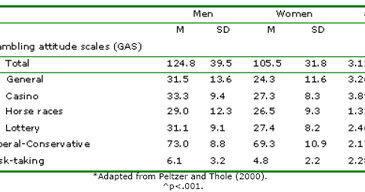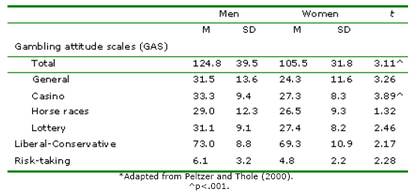According to Peltzer and Thole (2000), political changes in South Africa over the last decade have increased gambling opportunities. However, little scientific data exists regarding attitudes toward gambling among South Africa’s general population. Consequently, Peltzer and Thole (2000) examined gambling attitudes among Black students from one South African university.
To study attitudes, Peltzer and Thole (2000) recruited 134 first- and second-year university students for their research. Gambling Attitude Scales (GAS; i.e., GAS-General, GAS-Casino, GAS-Horse Races and GAS-Lottery; Kassinove, 1998) were administered via questionnaire. All responses were scored on a six-point Likert-type scale (1=strongly agree and 6=strongly disagree) and subsequently added together; high gambling attitude scores reflect a more positive attitude toward gambling (Kassinove, 1998).
Data indicate that gambling attitudes among Black South African university students differ significantly by sex (Peltzer and Thole, 2000). Specifically, GAS subscale score totals presented in Table 1 show that male university students have a more positive attitude toward gambling than female university students. However, when GAS subscales are examined separately, GAS-Casino is the only subscale that reflects significant attitudinal differences between male and female university students. Indeed, male students maintain a more positive attitude toward casino gambling than female students. Liberal-Conservative and Risk-Taking scales indicated that the positive gambling attitude of South African male university students is positively associated with liberal attitude and high risk-taking (Peltzer and Thole, 2000). Table 1 presents all of these results.
Table 1. GAS Differences between male and female black South African university students*
Peltzer and Thole (2000) have contributed to a sparse area of gambling research. However, their work includes a methodological weakness. Their research sample is homogeneous in terms of race and vocation. As such, the data cannot be used to generalize to other segments of the South African population. Furthermore, gambling attitudes might not predict gambling behavior. Therefore, this research on attitudes toward gambling does little to advance the understanding of disordered gambling. Future research in South Africa needs to determine the prevalence of all levels (i.e., levels 1, 2, and 3) of disordered gambling among general and vulnerable segments of the population. Such research might benefit South Africans who currently and perhaps unknowingly confront disordered gambling issues.
References
Kassinove, J. I. (1998). Development of the gambling attitudes scales: preliminary findings. Journal of Clinical Psychiatry, 54, 763-771.
Peltzer, K., & Thole, J. M. (2000). Gambling attitudes among Black South African university students. Psychological Reports, 86, 957-962.
The WAGER is a public education project of the Division on Addictions at Harvard Medical
School. It is funded, in part, by the National Center for Responsible Gaming, the
Massachusetts Department of Public Health, the Addiction Technology Transfer Center of New
England, the Substance Abuse and Mental Health Services Administration, and the Center for
Substance Abuse Treatment.





